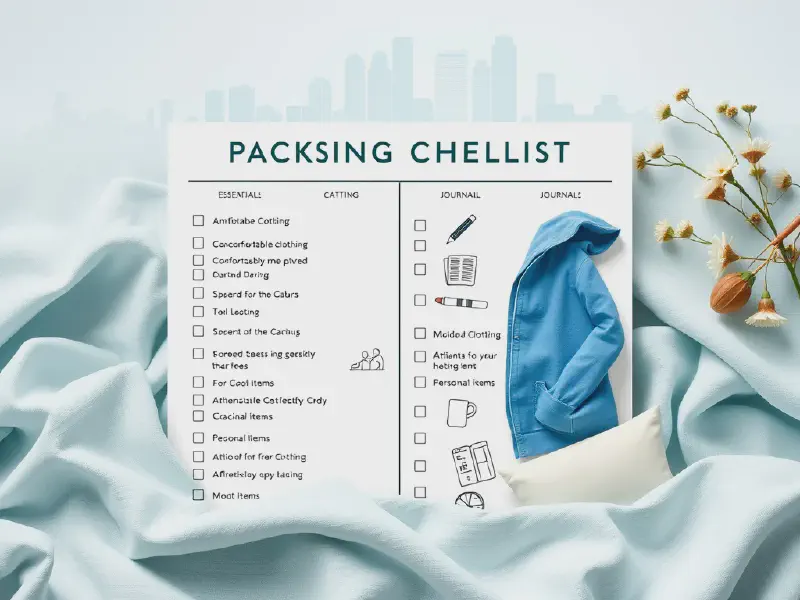
Inpatient Rehab Packing Checklist for Atlanta
Preparing for an inpatient rehab program can be both exciting and nerve-wracking. One important aspect is knowing what to pack for your stay. The right preparation will ensure you have everything you need to focus on your recovery while at the treatment center. This Inpatient Rehab Packing Checklist for Atlanta will guide you through what to bring, making sure you access all essential items easily during your stay.
Each rehab center may have specific guidelines on what you can and cannot bring, so it’s crucial to check your facility’s requirements before finalizing your bag. Generally, this Inpatient Rehab Packing Checklist for Atlanta includes clothing, personal care items, comfort items, communication tools, and important documents. Packing with care will help you feel more at home and comfortable during the recovery process.
In Atlanta, the weather can vary throughout the year, so it's essential to choose season-appropriate clothing and comfort items. By ensuring you have the right items as per the local climate, you can maintain your comfort throughout your stay in rehabilitation. Is it summer or winter? Knowing that will influence your choices for this packing checklist.
Maintaining a sense of normalcy is crucial during rehabilitation. Along with the necessary items for personal care and daily activities, entertainment and items that remind you of home can greatly enhance your experience. Make sure to include things that provide comfort and encourage relaxation.
Lastly, never underestimate the importance of good communication and support. Bring along items that help keep you connected to your loved ones and ensure you have necessary documentation ready for your treatment. This comprehensive Inpatient Rehab Packing Checklist for Atlanta will help ease the transition and support your journey towards recovery.
Clothing Items for Rehabilitation
Comfortable loungewear is key during your stay at a rehab facility. Opt for soft fabrics that allow for ease of movement, such as cotton or modal. You’ll be spending a lot of time relaxing and participating in therapeutic activities, so comfort is paramount.
When planning for your stay, it's essential to know What to Bring to Shepherd Center to ensure a comfortable experience.
It's wise to bring season-appropriate clothing. If you’re staying during the cooler months, include sweaters and warmer layers. For warmer months, breathable fabrics will keep you comfortable and cool. Layering options can also be a great way to adapt to the facility's indoor climate, which may vary from the outdoors.
Slip-on shoes are ideal for ease of use. They should be supportive yet easy to take on and off, especially if mobility is a concern. This also helps during therapy sessions where quick changes may be necessary.
Personal items are crucial for comfort. Bring pajamas, socks, and perhaps a cozy robe for those moments when you want to feel cozy and at home. These small touches can enhance your overall sense of well-being during your stay.
Personal Care Items
Don’t forget toiletries! Basic items like a toothbrush, toothpaste, deodorant, and other essentials should definitely make it onto your list. Having your personal hygiene products will help you feel refreshed and ready to tackle your treatment.
Including your skincare products is also essential for maintaining your daily routine. Whether you use moisturizer, sunscreen, or other products, keeping your skin healthy can be a comforting part of your regimen.
Hair care essentials like a brush, shampoo, and conditioner should be included as well. Maintaining personal grooming can significantly boost your mood and help you feel more in control during rehab.
Lastly, pack your regular medications. It's important to have these on hand, and ensure they are in their original containers. Be sure to inform your treatment team about any medications you are taking.
Entertainment and Comfort Items
Books or e-readers are great for leisure reading as they can help you escape and relax. Whether you prefer fiction or non-fiction, having a good book can be a therapeutic outlet during your rehab stay.
Notebooks and writing materials should also be included. You might want to journal your thoughts, feelings, or experiences during rehab, which can be a helpful reflective practice.
A portable music device and headphones can be comforting. Music can have therapeutic benefits and provide a sense of solace during tough moments. Create playlists that motivate you and help you feel good.
Pillows or blankets from home can provide added comfort. Familiar textures can enhance your environment and make it feel not just like a facility but also a safe space for healing.
Communication and Support Items
Bring chargers for your phones and tablets to keep connected. Staying in touch with loved ones can be a source of support, helping you feel less isolated during your time in rehabilitation.
An address book for important contacts is underappreciated. Knowing how to reach out to family, friends, or mentors can help you feel more secure and connected during your treatment.
Journals for reflection and documenting your thoughts can play a significant role in your healing journey. Write about your experiences, and progress, or even your struggles; it's a great way to process emotions.
Creating a list of key support people to keep in touch will make it easier to reach out when you’re in need of a morale boost, advice, or just a friendly chat during recovery.
Important Documents to Bring
Your insurance information and ID should be taken seriously and stored safely. This is essential for your treatment and ensuring that everything is processed smoothly with the facility.
Admission paperwork and medical records are also vital to bring along. Having your health history available helps the healthcare providers give you the best possible care.
Make sure to carry emergency contact information just in case. It’s important to have this readily accessible for both yourself and for the clinic in case of any emergencies.
Lastly, any legal documents relevant to treatment should not be overlooked. This can include advance directives or other important documents that may be necessary for your treatment decisions.
